The global smart inhalers market is estimated to grow from USD 22 billion in 2025 to approximately USD 131.8 billion by 2035, recording an absolute increase of USD 109.8 billion over the forecast period. This translates into a total growth of 498.6%, with the market forecast to expand at a compound annual growth rate (CAGR) of 19.6% between 2025 and 2035. The market size is expected to grow by nearly 5.99X during the same period, supported by increasing prevalence of respiratory diseases, rising adoption of digital health technologies, and growing focus on patient adherence monitoring and medication management.
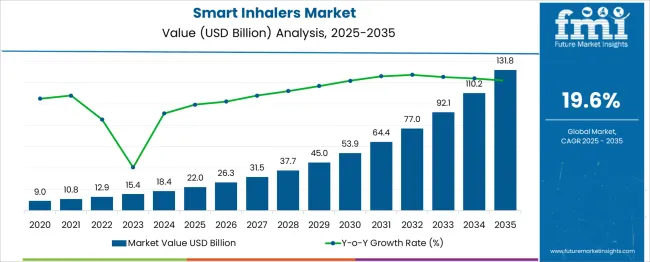
Between 2025 and 2030, the smart inhalers market is projected to expand from USD 22 billion to USD 64.4 billion, resulting in a value increase of USD 42.4 billion, which represents 38.6% of the total forecast growth for the decade. This phase of growth will be shaped by the rising prevalence of chronic respiratory diseases, increasing healthcare digitization, and growing penetration of IoT-enabled medical devices in emerging markets. Healthcare providers and pharmaceutical companies are expanding their smart inhaler portfolios to address the growing demand for connected health solutions and improved patient outcomes.
| Metric | Value |
|---|---|
| Estimated Value in (2025E) | USD 22 billion |
| Forecast Value in (2035F) | USD 131.8 billion |
| Forecast CAGR (2025 to 2035) | 19.6% |
From 2030 to 2035, the market is forecast to grow from USD 64.4 billion to USD 131.8 billion, adding another USD 67.4 billion, which constitutes 61.4% of the ten-year expansion. This period is expected to be characterized by widespread adoption of artificial intelligence and machine learning in respiratory care, integration of advanced sensor technologies, and development of personalized treatment protocols. The growing focuses on value-based healthcare and remote patient monitoring will drive demand for smart inhalers with enhanced connectivity and real-time data analytics capabilities.
Between 2020 and 2025, the market experienced accelerated expansion, driven by the COVID-19 pandemic's impact on respiratory health awareness and the urgent need for remote patient monitoring solutions. The market developed as healthcare systems recognized the critical importance of medication adherence in managing chronic respiratory conditions. Digital health adoption and telemedicine integration began focusing on the role of smart inhalers in comprehensive respiratory care management and reducing hospital readmissions.
Market expansion is being supported by the increasing global burden of respiratory diseases, including asthma and COPD, which affect over 1 billion people worldwide. The growing recognition of poor medication adherence as a primary cause of treatment failure and increased healthcare costs is driving demand for smart monitoring solutions. Healthcare providers and payers are increasingly focused on outcome-based care models that require precise medication tracking and patient engagement tools.
The rapid advancement of Internet of Things (IoT) technologies, sensor miniaturization, and mobile health applications is enabling the development of sophisticated smart inhaler platforms that can monitor usage patterns, environmental triggers, and treatment effectiveness. The integration of artificial intelligence and machine learning algorithms allows for personalized treatment recommendations and predictive analytics that can prevent exacerbations and improve patient outcomes.
The market is segmented by type, indication, distribution channel, end use, and region. By type, the market is divided into Metered Dose Inhalers (MDIs), Dry Powder Inhalers (DPIs), and others. Based on indication, the market is categorized into COPD, asthma, and others. In terms of distribution channel, the market is segmented into hospital pharmacies, retail pharmacies, and online pharmacies. By end use, the market is classified into hospitals, homecare settings, and others. Regionally, the market is divided into North America, Europe, East Asia, South Asia & Pacific, Latin America, and Middle East & Africa.
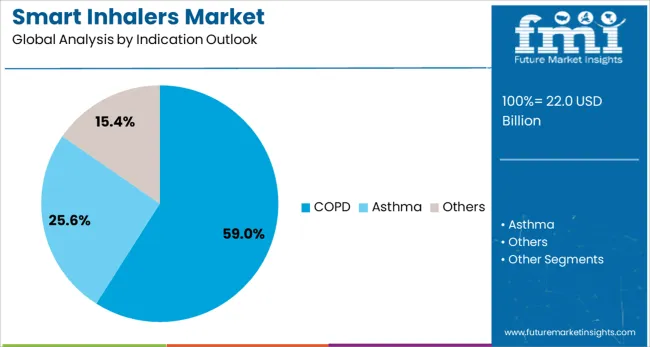
The COPD indication is projected to account for 59% of the smart inhalers market in 2025, reaffirming its position as the primary therapeutic focus driving market growth. COPD affects over 380 million people globally and represents one of the leading causes of morbidity and mortality worldwide. The chronic nature of COPD requires consistent medication adherence and continuous monitoring to prevent exacerbations and disease progression.
Smart inhalers provide critical value in COPD management by tracking medication usage patterns, monitoring inhaler technique, and providing real-time feedback to patients and healthcare providers. The ability to detect early signs of exacerbations through usage pattern analysis and environmental trigger identification makes smart inhalers essential tools in comprehensive COPD care management. With an aging global population and increasing exposure to air pollution and smoking-related risks, the COPD segment continues to drive innovation and investment in smart inhaler technologies.
Metered Dose Inhalers (MDIs) are projected to represent 64.2% of smart inhaler demand in 2025, underscoring their dominance as the preferred delivery mechanism for smart inhaler technologies. MDIs offer several advantages, including precise dose delivery, widespread familiarity among patients and healthcare providers, and an established manufacturing infrastructure that supports cost-effective smart technology integration.
The segment benefits from the ability to retrofit existing MDI platforms with smart sensors and connectivity modules, making the transition to digital health solutions more accessible for both manufacturers and patients. Advanced MDI smart inhalers can monitor actuation timing, coordinate with breathing patterns, and provide detailed usage analytics that support personalized treatment optimization. As healthcare systems prioritize medication adherence and outcome measurement, smart MDIs continue to represent the most practical and scalable solution for respiratory care digitization.
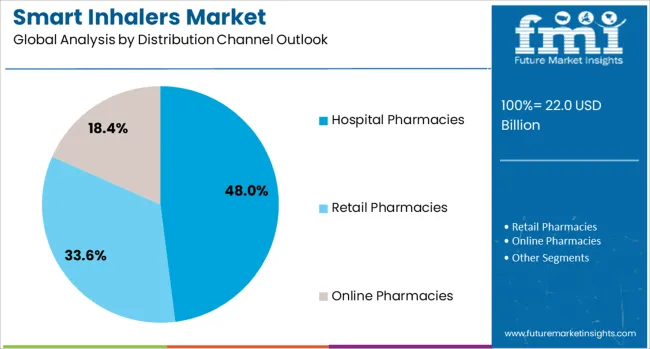
Hospital pharmacies are forecasted to contribute 48.0% of the smart inhalers market in 2025, reflecting their critical role in introducing patients to smart inhaler technologies and providing comprehensive respiratory care management. Hospital-based distribution ensures proper patient education, device training, and integration with electronic health records for seamless care coordination.
The segment benefits from direct relationships between pharmaceutical companies and healthcare institutions, enabling bulk purchasing agreements and comprehensive service contracts that support long-term patient management. Hospital pharmacies also provide essential clinical support services, including inhaler technique assessment, adherence monitoring, and medication therapy management that maximize the therapeutic value of smart inhaler investments. With an increasing focus on reducing hospital readmissions and improving chronic disease outcomes, hospital pharmacy distribution represents a strategic channel for promoting smart inhaler adoption and achieving clinical success.
The market is advancing rapidly due to increasing burden of respiratory diseases, growing focuses on medication adherence, and expanding adoption of digital health technologies. The market faces challenges including high device costs, data privacy concerns, and complex regulatory requirements. Innovation in sensor technologies, artificial intelligence integration, and patient engagement platforms continue to influence product development and market expansion patterns.
The incorporation of AI and ML algorithms in smart inhaler platforms is enabling predictive analytics, personalized treatment recommendations, and automated health insights. These technologies can analyze usage patterns, environmental data, and patient symptoms to predict exacerbations, optimize medication timing, and provide personalized care recommendations. AI-powered smart inhalers can also learn individual patient behaviors and preferences to improve engagement and adherence rates.
The growing adoption of telemedicine platforms is creating new opportunities for smart inhaler integration with virtual care delivery models. Remote patient monitoring capabilities allow healthcare providers to track medication adherence, assess treatment effectiveness, and intervene proactively when issues are detected. This trend is particularly important for managing chronic respiratory conditions that require ongoing monitoring and frequent care adjustments.
Modern smart inhaler manufacturers are developing integrated digital health platforms that combine device connectivity with mobile applications, cloud-based analytics, and healthcare provider dashboards. These comprehensive ecosystems provide holistic respiratory care management, including medication tracking, symptom monitoring, environmental trigger identification, and care team communication. The integration of multiple data sources enables more accurate treatment optimization and better patient outcomes.
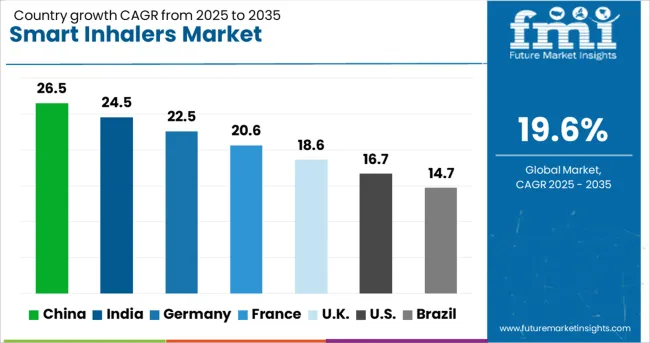
| Country | CAGR (2025-2035) |
|---|---|
| China | 26.5% |
| India | 24.5% |
| Germany | 22.5% |
| France | 20.6% |
| UK | 18.6% |
| USA | 16.7% |
| Brazil | 14.7% |
The market is experiencing robust growth globally, with China leading at a 26.5% CAGR through 2035, driven by massive healthcare modernization efforts, increasing air pollution awareness, and government support for digital health innovations. India follows at 24.5%, supported by expanding healthcare infrastructure, a growing middle class, and an increasing prevalence of respiratory diseases. Germany exhibits strong growth of 22.5%, with a focus on precision medicine and the integration of digital health. France records 20.6%, focusing on healthcare innovation and chronic disease management. The UK demonstrates 18.6% growth, prioritizing NHS digitization and value-based care initiatives.
The report provides an in-depth analysis of over 40 countries, with six top-performing countries highlighted below.
Revenue from smart inhalers in China is projected to exhibit exceptional growth with a CAGR of 26.5% through 2035, driven by government initiatives to modernize healthcare infrastructure and address the growing burden of respiratory diseases caused by air pollution and urbanization. The country's massive population base and increasing healthcare expenditure are creating unprecedented demand for advanced respiratory care solutions. Major international and domestic medical device companies are establishing comprehensive manufacturing and distribution networks to serve the rapidly expanding market.
Revenue from smart inhalers in India is expanding at a CAGR of 24.5%, supported by increasing healthcare infrastructure development, growing disposable income, and rising awareness of chronic respiratory disease management. The country's large population base and increasing prevalence of asthma and COPD are driving demand for innovative treatment solutions. International medical device manufacturers and local healthcare companies are establishing distribution channels to serve the growing demand for connected health technologies.
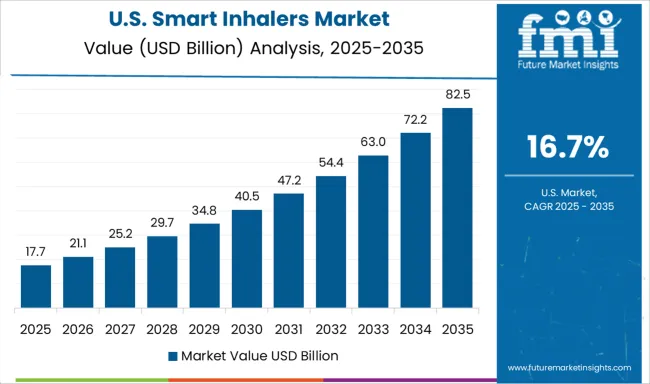
Demand for smart inhalers in the USA is projected to grow at a CAGR of 16.7%, supported by healthcare system focuses on value-based care models and improved patient outcomes. American healthcare providers are increasingly focused on reducing hospital readmissions, improving medication adherence, and demonstrating measurable treatment effectiveness. The market is characterized by strong demand for comprehensive digital health platforms that integrate with existing healthcare IT infrastructure.
Revenue from smart inhalers in Germany is projected to grow at a CAGR of 22.5% through 2035, driven by the country's strong focus on precision medicine, digital health innovation, and evidence-based treatment protocols. German healthcare systems consistently demand high-quality, clinically validated solutions that integrate seamlessly with existing care pathways and demonstrate measurable patient benefits.
Revenue from smart inhalers in the UK is projected to grow at a CAGR of 18.6% through 2035, supported by NHS digital transformation initiatives and focuses on chronic disease management efficiency. British healthcare systems value cost-effectiveness, clinical evidence, and patient engagement, positioning smart inhalers as essential tools for modern respiratory care delivery.
Revenue from smart inhalers in France is projected to grow at a CAGR of 20.6% through 2035, supported by the country's strong focuses on healthcare innovation, medical research, and comprehensive chronic disease management. French healthcare systems prioritize patient-centered care and innovative treatment approaches that improve quality of life for chronic disease patients.
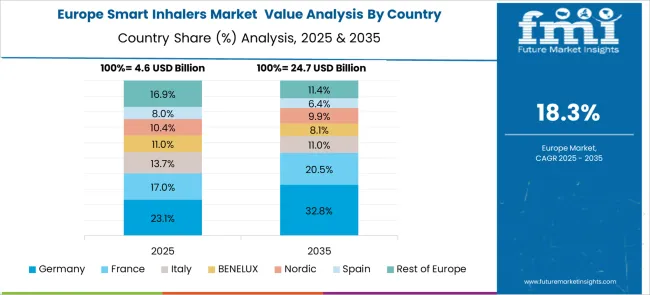
The European market demonstrates sophisticated development across major economies with Germany leading through its precision medical device engineering excellence and advanced digital health capabilities, supported by companies focusing on AI-powered respiratory monitoring systems, comprehensive patient data analytics, and integrated healthcare technology solutions while maintaining strict regulatory standards and clinical validation protocols. The UK shows strength in NHS digital transformation initiatives and value-based care approaches, with organizations specializing in connected respiratory care platforms and chronic disease management systems that meet rigorous healthcare standards.
France contributes through its healthcare innovation excellence and comprehensive chronic disease management programs, delivering advanced smart inhaler solutions that combine medical research expertise with modern digital health technologies. Sweden and Nordic countries focuses on patient-centered digital health innovations and healthcare technology development. Italy and Spain demonstrate growth in specialized respiratory care applications and healthcare system digitization initiatives. The market benefits from stringent EU medical device regulations, established healthcare technology infrastructure, and growing demand for connected medical devices that provide superior patient outcomes.
The Japanese market demonstrates steady growth driven by precision healthcare technology focus, advanced sensor development capabilities, and healthcare system preference for high-quality connected medical devices that ensure superior patient monitoring and treatment compliance throughout respiratory care management. Japanese organizations prioritize sophisticated sensor technologies and comprehensive quality assurance systems, creating demand for smart inhalers featuring advanced IoT connectivity, real-time data analytics, and integrated healthcare platform compatibility that align with Japanese precision manufacturing standards.
The market focuses on technological innovation in sensor miniaturization, data accuracy enhancement, and patient engagement systems that reflect Japanese attention to detail in medical device development and healthcare technology integration. Growing investment in aging population healthcare solutions and digital transformation supports the adoption of intelligent respiratory monitoring systems with predictive analytics, personalized treatment optimization, and comprehensive care coordination capabilities. Japanese healthcare providers focus on device reliability, consistent performance outcomes, and long-term patient health improvement through advanced technology integration.
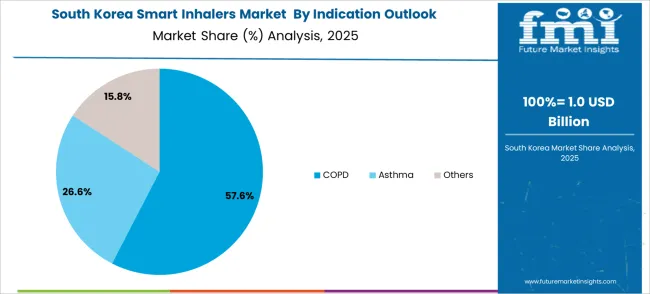
The South Korean market shows exceptional growth potential driven by expanding digital health infrastructure, increasing adoption of IoT medical devices, and growing healthcare provider demand for advanced respiratory monitoring solutions requiring comprehensive connectivity and data management capabilities. The market benefits from South Korea's technological leadership in electronics and telecommunications and increasing focus on healthcare innovation that drives investment in sophisticated medical device platforms meeting international healthcare standards.
Korean healthcare organizations increasingly adopt connected health technologies, artificial intelligence-powered treatment protocols, and integrated patient monitoring systems to improve respiratory care outcomes and healthcare system efficiency while ensuring regulatory compliance requirements. The growing influence of Korean technology companies and healthcare innovation initiatives supports demand for advanced smart inhaler platforms that ensure comprehensive functionality while maintaining cost-effectiveness and patient accessibility. The integration of 5G connectivity and mobile health applications creates opportunities for next-generation respiratory monitoring systems with real-time data transmission capabilities.
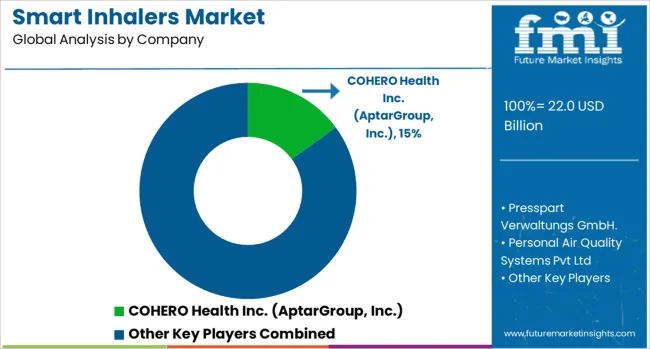
The market is characterized by intense competition among established pharmaceutical companies, medical device manufacturers, and emerging digital health innovators. Companies are investing in advanced sensor technologies, artificial intelligence platforms, comprehensive patient engagement solutions, and strategic partnerships to deliver effective, user-friendly, and clinically validated smart inhaler systems. Innovation in connectivity, data analytics, and patient experience design are central to strengthening product portfolios and market leadership positions.
COHERO Health Inc. (AptarGroup, Inc.), USA-based, leads the market with 15.0% global value share, offering comprehensive smart inhaler platforms with focus on medication adherence monitoring and patient engagement. Presspart Verwaltungs GmbH provides advanced inhaler manufacturing capabilities and smart technology integration. Personal Air Quality Systems Pvt Ltd delivers innovative air quality monitoring solutions integrated with respiratory care management. Cognita Labs focuses on AI-powered respiratory health analytics and personalized treatment optimization.
Adherium offers comprehensive medication adherence monitoring platforms with proven clinical outcomes and healthcare system integration. Amiko Digital Health Limited provides user-friendly smart inhaler solutions with a focus on patient experience and care team connectivity. Teva Pharmaceuticals Industries Ltd. leverages its pharmaceutical expertise to develop integrated drug-device combinations with smart monitoring capabilities. Propeller Health (ResMed) delivers comprehensive digital respiratory care platforms with extensive healthcare provider partnerships. Novartis AG provides pharmaceutical-grade smart inhaler solutions with a focus on clinical validation and regulatory compliance. Pneuma Respiratory Inc. focuses on innovative sensor technologies and real-time respiratory monitoring. 3M offers comprehensive medical device manufacturing capabilities and smart technology integration. AireHealth Inc. and FindAir Sp. z o.o provides specialized smart inhaler platforms with a focus on patient engagement and treatment optimization.
| Items | Values |
|---|---|
| Quantitative Units (2025) | USD 22 billion |
| Type | Metered Dose Inhalers (MDIs), Dry Powder Inhalers (DPIs), Others |
| Indication | COPD, Asthma, Others |
| Distribution Channel | Hospital Pharmacies, Retail Pharmacies, Online Pharmacies |
| End Use | Hospitals, Homecare Settings, Others |
| Regions Covered | North America, Europe, East Asia, South Asia & Pacific, Latin America, Middle East & Africa |
| Countries Covered | United States, Canada, United Kingdom, Germany, France, China, Japan, South Korea, India, Brazil, Australia and 40+ countries |
| Key Companies Profiled | COHERO Health Inc. (AptarGroup, Inc.), Presspart Verwaltungs GmbH, Personal Air Quality Systems Pvt Ltd, Cognita Labs, Adherium, Amiko Digital Health Limited, Teva Pharmaceuticals Industries Ltd., Propeller Health (ResMed), Novartis AG, and Pneuma Respiratory Inc. |
| Additional Attributes | Dollar sales by inhaler type and technology integration level, regional adoption trends, competitive landscape, healthcare provider preferences for platform integration versus standalone devices, integration with electronic health records and telemedicine platforms, innovations in sensor technologies, AI-powered analytics, and patient engagement solutions |
The global smart inhalers market is estimated to be valued at USD 22.0 billion in 2025.
The market size for the smart inhalers market is projected to reach USD 131.8 billion by 2035.
The smart inhalers market is expected to grow at a 19.6% CAGR between 2025 and 2035.
The key product types in smart inhalers market are metered dose inhalers (mdis) and dry powdered inhalers (dpis).
In terms of indication outlook, copd segment to command 59.0% share in the smart inhalers market in 2025.






Our Research Products

The "Full Research Suite" delivers actionable market intel, deep dives on markets or technologies, so clients act faster, cut risk, and unlock growth.

The Leaderboard benchmarks and ranks top vendors, classifying them as Established Leaders, Leading Challengers, or Disruptors & Challengers.

Locates where complements amplify value and substitutes erode it, forecasting net impact by horizon

We deliver granular, decision-grade intel: market sizing, 5-year forecasts, pricing, adoption, usage, revenue, and operational KPIs—plus competitor tracking, regulation, and value chains—across 60 countries broadly.

Spot the shifts before they hit your P&L. We track inflection points, adoption curves, pricing moves, and ecosystem plays to show where demand is heading, why it is changing, and what to do next across high-growth markets and disruptive tech

Real-time reads of user behavior. We track shifting priorities, perceptions of today’s and next-gen services, and provider experience, then pace how fast tech moves from trial to adoption, blending buyer, consumer, and channel inputs with social signals (#WhySwitch, #UX).

Partner with our analyst team to build a custom report designed around your business priorities. From analysing market trends to assessing competitors or crafting bespoke datasets, we tailor insights to your needs.
Supplier Intelligence
Discovery & Profiling
Capacity & Footprint
Performance & Risk
Compliance & Governance
Commercial Readiness
Who Supplies Whom
Scorecards & Shortlists
Playbooks & Docs
Category Intelligence
Definition & Scope
Demand & Use Cases
Cost Drivers
Market Structure
Supply Chain Map
Trade & Policy
Operating Norms
Deliverables
Buyer Intelligence
Account Basics
Spend & Scope
Procurement Model
Vendor Requirements
Terms & Policies
Entry Strategy
Pain Points & Triggers
Outputs
Pricing Analysis
Benchmarks
Trends
Should-Cost
Indexation
Landed Cost
Commercial Terms
Deliverables
Brand Analysis
Positioning & Value Prop
Share & Presence
Customer Evidence
Go-to-Market
Digital & Reputation
Compliance & Trust
KPIs & Gaps
Outputs
Full Research Suite comprises of:
Market outlook & trends analysis
Interviews & case studies
Strategic recommendations
Vendor profiles & capabilities analysis
5-year forecasts
8 regions and 60+ country-level data splits
Market segment data splits
12 months of continuous data updates
DELIVERED AS:
PDF EXCEL ONLINE
Smart School Bus Platform Market Size and Share Forecast Outlook 2025 to 2035
Smart Home Wireless Smoke Detector Market Size and Share Forecast Outlook 2025 to 2035
Smart Bus Platform Market Size and Share Forecast Outlook 2025 to 2035
Smart Vision Processing Chips Market Size and Share Forecast Outlook 2025 to 2035
Smart Touch Screen Scale Market Size and Share Forecast Outlook 2025 to 2035
Smart Magnetic Drive Conveyor System Market Size and Share Forecast Outlook 2025 to 2035
Smart Wheelchair market Size and Share Forecast Outlook 2025 to 2035
Smart Mining Technologies Market Size and Share Forecast Outlook 2025 to 2035
Smart Parking Market Size and Share Forecast Outlook 2025 to 2035
Smart Digital Valve Positioner Market Forecast and Outlook 2025 to 2035
Smart Card IC Market Size and Share Forecast Outlook 2025 to 2035
Smart-Tag Inlay Inserters Market Analysis - Size and Share Forecast Outlook 2025 to 2035
Smart TV Market Forecast and Outlook 2025 to 2035
Smart/AI Toy Market Size and Share Forecast Outlook 2025 to 2035
Smart Locks Market Size and Share Forecast Outlook 2025 to 2035
Smart Sprinkler Controller Market Size and Share Forecast Outlook 2025 to 2035
Smart Indoor Gardening System Market Size and Share Forecast Outlook 2025 to 2035
Smart Building Delivery Robot Market Size and Share Forecast Outlook 2025 to 2035
Smart Watch Market Size and Share Forecast Outlook 2025 to 2035
Smart Label Market Size and Share Forecast Outlook 2025 to 2035

Thank you!
You will receive an email from our Business Development Manager. Please be sure to check your SPAM/JUNK folder too.
Chat With
MaRIA